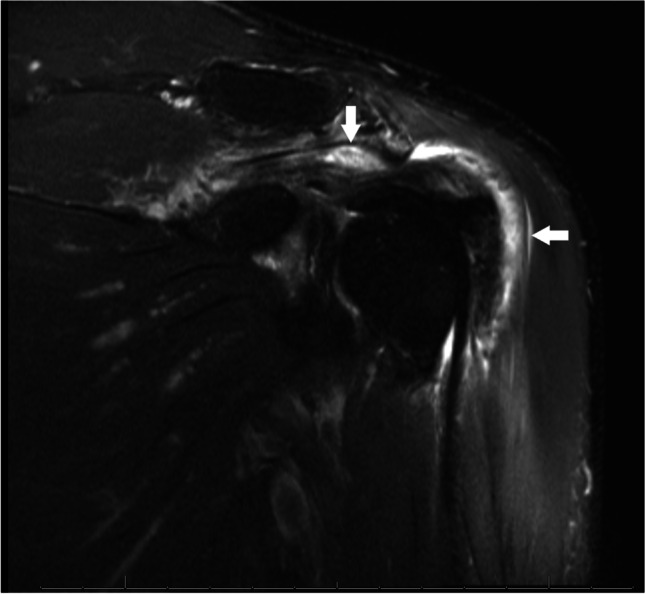A 74-year-old man developed acute atraumatic left shoulder pain and limited range of motion (ROM) 3 days after COVID-19 vaccination in the left deltoid. Physical exam revealed subacromial region tenderness, severely limited ROM (active and passive), weakness (drop arm, abduction strength 3/5, including on breakaway weakness testing), and impingement signs. Due to weakness and marked ROM limitation, a shoulder MRI was obtained to rule out full thickness rotator cuff tear and adhesive capsulitis, respectively. MRI showed extensive subacromial and subdeltoid bursitis (Fig. 1). The patient opted for subacromial space corticosteroid injection and physical therapy (PT). At the initial PT appointment 4 weeks after injection, he had full strength, near-full ROM, and had resumed his usual activities with minimal pain. Given the rapid improvement, we suspect the initial weakness and limited ROM were related to severe pain.
Fig. 1.

Left shoulder MRI showing subacromial (top arrow) and subdeltoid (right arrow) bursitis.
Post-vaccination subacromial bursitis likely results from injection into or near the subacromial bursa.1,2 Emphasis on correct technique (including needle length, site, and angle) may reduce the risk of post-vaccination shoulder injury.2 CDC recommendations advise selecting needle length based on weight (1–1.5-in. needle, 1 in. for weight < 152 lbs), inserting the needle approximately 2 in. below the acromion process at a 90° angle (www.cdc.gov/vaccines/hcp/admin/downloads/IM-Injection-adult.pdf).
Footnotes
Publisher's Note
Springer Nature remains neutral with regard to jurisdictional claims in published maps and institutional affiliations.
References
- 1.Hesse EM, Navarro RA, Daley MF, Getahun D, Henninger ML, Jackson LA, Nordin J, Olson SC, Zerbo O, Zheng C, Duffy J. Risk for Subdeltoid Bursitis After Influenza Vaccination: A Population-Based Cohort Study. Ann Intern Med. 2020;173(4):253–261. doi: 10.7326/M19-3176. [DOI] [PubMed] [Google Scholar]
- 2.Martin Arias LH, Sanz Fadrique R, Sainz Gil M, Salgueiro-Vazquez ME. Risk of bursitis and other injuries and dysfunctions of the shoulder following vaccinations. Vaccine. 2017;35(37):4870–4876. doi: 10.1016/j.vaccine.2017.07.055. [DOI] [PubMed] [Google Scholar]


